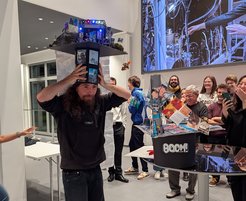Albert Gasull Celades: Expanding the boundaries of tensor networks
The PhD student completed his dissertation in the institute’s Theory division.
In his PhD thesis, Albert Gasull Celades explored the potential of tensor networks as a tool for describing chiral gapped condensed matter systems. His work showed how methods from quantum field theory could extend the range of applicability of tensor network theory, enabling it to handle previously intractable systems. His results effectively render tensor networks a more complete and powerful theory for condensed matter, allowing them to describe a wider variety of systems using exclusively analytical techniques.

Albert Gasull Celades’ research focused on expanding an already versatile tool for theorists working in condensed matter physics: tensor networks. These networks have proven to be extremely useful tools to describe complex systems theoretically, but until now, chiral gapped systems eluded anexact analytical description in terms of tensor networks. Chiral gapped systems are a family of systems of interacting electrons that are very important to physicists, as they constitute one of the first historical examples of topological order, which is an exotic phase of matter that could be used in quantum computing.
The theorist bridged this gap by using techniques from quantum field theory to extend the theory of tensor networks to chiral gapped systems, previously out of reach for purely analytical methods. By borrowing these techniques from the continuum, he defined a new class of tensor networks that use infinite-dimensional functional spaces in order to precisely describe these chiral systems. These spaces were necessary to circumvent the previously stablished no-go results, which had prevented an analytical description with standard tensor networks techniques up to this point.
“My PhD work has not only been a technical challenge but also a deeply rewarding experience, especially considering the intellectual journey and the opportunity to contribute to a field that continues to evolve rapidly,” Albert explains.
Over the course of his time at MPQ, Albert had the chance to work alongside remarkable colleagues and contribute to the Theory Division’s growth and transformation. “When I first arrived at MPQ, the Theory Division looked very different from today. Being part of its evolution and seeing the changes over the years has been an incredible experience,” Albert says.
What’s next?
After successfully defending his thesis, Albert will continue his academic journey with a postdoctoral position at the Lorentz Institute, working with Jordi Tura, another former member of MPQ’s Theory division. He is excited to bring everything he’s learned at MPQ into a new environment. “I’m looking forward to exploring new topics and contributing to another research group while building on the knowledge I’ve gained here at MPQ,” Albert remarks.












